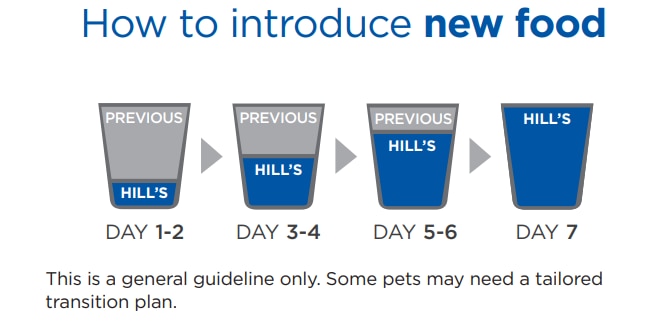The Hill's 100% Satisfaction Guarantee How it works
The Hill's 100% Satisfaction Guarantee How it works


Hill's is committed to using high quality ingredients which provide the proper balance of essential nutrients for your pet, and we produce our foods using stringent safety standards.
We offer a 100% Satisfaction Guarantee for quality, consistency and taste for all of our products. If you or your pet are not completely satisfied with the quality, consistency or taste of any Hill’s diet, you can get your money back.
Our 100% Satisfaction Guarantee applies to all Hill's brands- Science Plan, Prescription Diet and Vet Essentials.
How to Claim
- Get in touch with your retailer or vet clinic and let them know you would like to make a claim.
- Your retailer or vet clinic will need the manufacturing code and stock number on the packaging and will advise you to either return or retain the product.
- Your retailer or vet clinic will give you a full refund or replacement, whichever you prefer




In general, dogs and cats tend to be creatures of habit and may require some help when changing foods, especially if they are used to eating a single type of food; it is quite normal for cats and dogs to refuse new food when it is first offered. Changes to diet affect animals in different ways, so it is important to manage any change carefully. The golden rule is to introduce the new food gradually, as this will help them become more familiar with the new food- they will get used to the taste, smell, texture and size of the new kibbles. Also, a gradual change to new food reduces the chance of your pet having a stomach upset.
There are some circumstances where the guarantee doesn’t apply.
Efficacy
The efficacy of a diet- how well it works for your pet- isn’t covered by the Hill’s Guarantee. Not all pet foods will work for every issue a pet might be experiencing, so as there is nothing wrong with the diet (it’s just not the right clinical choice) this wouldn’t be covered.
Wrong Product Ordered
An error in ordering isn’t covered under the Hill’s Guarantee. If the clinic has ordered the wrong food for you, they will be able to refund you or replace the food under their own return policy. If you have ordered the wrong food, then we would recommend speaking to your retailer and asking them if it’s possible to return it.
A Change of Diet
A change in diet isn’t covered under the Hill’s Guarantee, as there is nothing wrong with the food - it’s just no longer the right clinical choice for your pet. If you have any unopened products, your retailer may be willing to refund you under their own returns policy. We would recommend speaking to your retailer to find out what their rules are.
Whether it’s pets, the people who care for them, or the planet we share together, Hill’s has a long history of using science to transform lives. As our company has grown, so has our commitment to sustainability and making a positive impact in everything we do.
Whether it’s pets, the people who care for them, or the planet we share together, Hill’s has a long history of using science to transform lives. As our company has grown, so has our commitment to sustainability and making a positive impact in everything we do.











